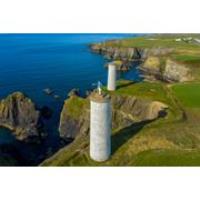
Uisce Éireann’s investment in Ireland’s wastewater infrastructure is benefitting communities around the country by supporting sustainable growth and development, enhancing water quality and protecting the environment.
The latest EPA Urban Wastewater Treatment Report published today, shows the progress being made in tackling long-running issues like raw sewage discharges, while also underlining the need for continued investment in our essential wastewater services.
2022 saw the highest annual investment in wastewater to date as Uisce Éireann continues to make progress in priority areas such as locations where there is raw sewage entering the rivers, lakes and the sea, and sites identified by the European Court of Justice under the Urban Wastewater Treatment Directive. The building, repair and upgrading of Ireland’s wastewater treatment plants and sewer network will require a multi-billion-euro investment programme over many years. Uisce Éireann is focussed on delivering the best possible service improvements, while maximising return on investment.
In Waterford, this investment by Uisce Éireann has led to improved wastewater treatment in a number of communities, including upgrades to the wastewater networks in Tramore and Kilbarry. In addition, Uisce Éireann has commenced construction on a new pump station in Ferrybank which will enable economic growth and development in a sustainable manner while ensuring environmental protection. The project will involve decommissioning the existing Pump Station at the Dunlop site, which now forms an integral part of the North Quays Strategic Development Zone.
Plans are progressing on a major project to upgrade and modernise Waterford City Wastewater Treatment Plant, the third largest wastewater treatment plant in Ireland, located near Belview Port. When completed, the upgrades will ensure environmental compliance while catering for a growing population across Waterford City and South Kilkenny. Uisce Éireann is also progressing plans to upgrade and improve the sewer network in Baile na nGall near Dungarvan which will protect the environment by improving water quality in Dungarvan Bay, a Special Area of Conservation (SAC), and significantly reduce the risk of sewer flooding to homes and businesses. The project will also support the local fishing community by helping to protect the aquatic habitat of oysters and other shellfish to support production within the designated shellfish water. A project under Uisce Éireann’s Small Towns and Villages Growth Programme is also planned in Lemybrien. All of these projects will be progressed through the current and future investment cycles, subject to statutory planning and approvals.
Uisce Éireann is also driving sustained improvement in existing wastewater treatment standards. Last year 91% of Ireland’s treatment plants were fully compliant with the Urban Wastewater Treatment Directive. For those plants that are not currently achieving compliance, Uisce Éireann has a plan of action to address any deficiencies and bring them up to the appropriate standard as quickly as possible.
Brian Sheehan, Uisce Éireann’s Head of Infrastructure Delivery, noted that: Ending raw sewage discharges and improving wastewater treatment for communities across the country are priorities for Uisce Éireann. We are making huge strides in addressing these issues and we are now seeing real and tangible benefits from the unprecedented level of investment in this essential infrastructure. To date over 70% of raw sewage discharges nationwide have been eliminated and we are on track to end the majority by 2025. Our targeted programme of investment in existing wastewater plants and networks is also helping to protect the environment and enhance water quality.
“The timely delivery of this infrastructure and these services is a critical component in supporting sustainable social and economic development. Last year we invested over €1bn in water and wastewater projects, and we will need to maintain this level of funding in the years to come. It will also be necessary to address existing issues in our planning and approvals system so that large scale critical infrastructure can progress within a reasonable timeframe. We will continue to work with Government and our regulators, including the EPA and CRU, to ensure we can rise to the challenge of delivering transformative wastewater services to enable communities to thrive.”



